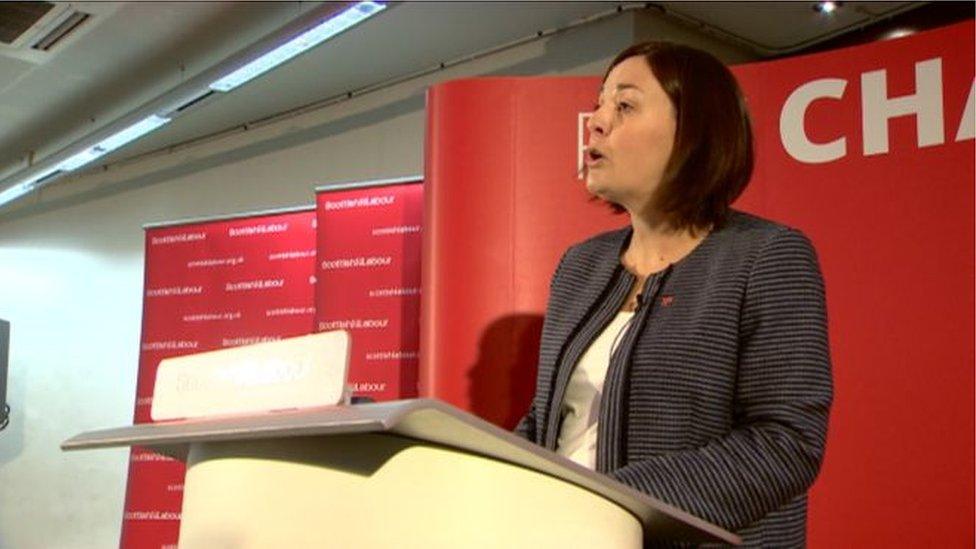Scottish Labour 'drops' £100 income tax rebate plan
- Published

Ms Dugdale announced the £100 rebate plan at an event in February
Scottish Labour has confirmed it will no longer offer a £100 payment to workers earning less than £20,000 as part of its income tax proposals.
The party said in February the "annual boost" would offset its plans for a 1p increase in th basic income tax rate.
But it now says changes to the personal allowance for income tax meant the rebate was no longer necessary.
The SNP and Conservatives have accused Labour of breaking a promise to low-paid workers.
Scottish Labour said the payment of £100 was intended to be for one year to ensure that those earning under £20,000 would not pay more tax.
A spokesman insisted: "We always said this was for 2016/17 only".
Election leaflet
But a document on the Scottish Labour website, external described the £100 payment as an "annual boost" for those earning less than £20,000, with the scheme to be administered by local authorities.
And the SNP said Labour had been delivering an election leaflet that stated "a new payment would mean that low income tax payers would be better off".
Scottish Labour leader Kezia Dugdale announced her proposals to increase the Scottish rate of income tax by 1p across all bands on 2 February. The move was designed to raise £500m for education and other local services.
Ms Dugdale said the £100 payment, which would be administered by councils, would be "far in excess" of the additional £20 which someone earning just above the minimum wage would pay in income tax over the course a year as a result of the 1p rise.
A Scottish Labour spokesman told BBC Scotland on Wednesday that the personal threshold increase announced by George Osborne in the UK Budget, as well as new powers over income tax coming to Scotland next year, meant the rebate would no longer be necessary.
But the party conceded it could mean some people on lower incomes could end up paying more in tax than their counterparts elsewhere in the UK.

Analysis by Glenn Campbell, BBC Scotland political correspondent
Labour wants to put a penny on all rates of income tax, including the basic rate.
The party leader Kezia Dugdale has always been clear that she would protect those on low incomes earning less than £20,000 from feeling the squeeze as a result of that.
In the BBC leaders's debate last Thursday, she said she would do that using Holyrood's new powers to set new thresholds to protect those on low incomes.
But last night in the STV debate, when she was pressed on this issue by the SNP leader Nicola Sturgeon, she made reference to the raising of the personal allowance - the point at which people qualify for the basic rate of income tax - by the Chancellor at Westminster.
He has decided to raise that personal allowance, and Labour it seems over the weekend have decided that that fixes their problem for them, and that they will not go down the route of setting new thresholds at Holyrood which might cost them revenue further up the scale.
Now Labour's opponents say they're all over the place, but Labour insist theirs is the right policy to generate new cash to help protect public services

Labour has also proposed raising the top rate of income tax for those earning more than £150,000 from 45p to 50p, which it said would mean "the wealthiest will pay the most to stop the cuts."
'True betrayal'
But SNP leader Nicola Sturgeon said Labour had "clearly made promises to taxpayers that they are not willing or able to keep" on the £100 rebate.
She added: "It is bad enough that the Labour party wants to put up taxes on 2.2 million basic rate taxpayers including 500,000 pensioners, but to fail to offer any protection to those on the lowest earnings would be a true betrayal of Labour's roots.
"Tackling austerity means protecting people on low incomes from Tory cuts, not making them pay for it."
Scottish Conservative leader Ruth Davidson said Ms Dugdale's plan for a £100 rebate had been "so ludicrously ill-thought out that even she has now decided to scrap it."
Ms Davidson said: "Unfortunately, in its place she has decided just to take more money out of the pay-packets of those on below-average incomes."
And she said Labour's proposals would effectively mean lower-paid workers in Scotland would not benefit from the changes made by Mr Osborne to the personal allowance.